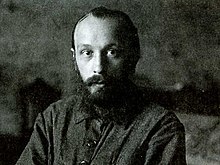Bakhtin
| Subject classification: this is a anthropology resource. |
Mikhail Mikhailovich Bakhtin | |
|---|---|
 | |
| Born | 16 November 1895 |
| Died | 7 March 1975 |
| Nationality | Russian |
| Occupation | Philosopher |
Bakhtin, M.M. (1984). trans. by Caryl Emerson. ed. Problems of Dostoevsky’s Poetics. Minneapolis: University of Michigan Press.
Mikhail Mikhailovich Bakhtin (November 17, 1895 – March 7, 1975) was a Russian philosopher, literary critic, semiotician and scholar who wrote influential works of literary and rhetorical theory and criticism. His works, dealing with a variety of subjects, have inspired groups of thinkers such as neo-Marxists, structuralists, and semioticians, who have all incorporated Bakhtinian ideas into theories of their own. Among the circle of Russian/Soviet writers who made important contributions to aesthetic analysis during the first third of the 20th Century (including Yury Tynyanov and Boris Eikhenbaum), Bakhtin has been the main contributor; he was among the leaders of the Formalism circle in Leningrad who helped develop a new "materialistic" view of Russian literature. After some time out of favour, his work has recently become fashionable once more.
Key Ideas
editThe Utterance
editFor Bakhtin the basic unit of language was the utterance, defined as the continual speech of one voice. The structuralist tendency to reduce language to the basic unit of the word ignores the dialogic nature of the speech act.
Heteroglossia
editHeteroglossia literally means many-voice-ness.
The Carnival/The Grotesque
editBakhtin in Relation to Structuralist Linguistics
editImpact on Anthropology
editReading List
editExternal links
edit- The Bakhtin Circle, Internet Encyclopedia of Philosophy
- The Bakhtin Centre, University of Sheffield
- A Bakhtin profile by James P. Zappen
- "INTERNATIONAL MAN OF MYSTERY - The Battle over Mikhail Bakhtin" by Matt Steinglass, in Lingua Franca, (April 1998).